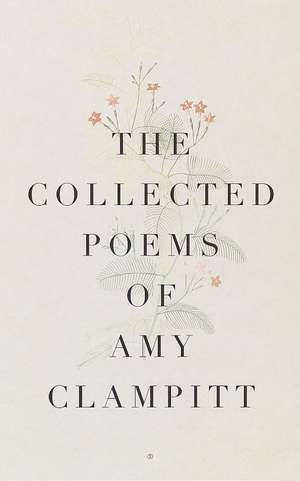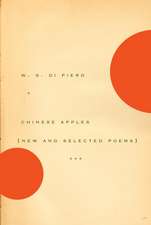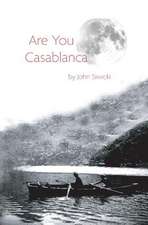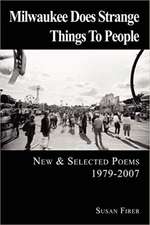The Collected Poems of Amy Clampitt
Autor Amy Clampitten Limba Engleză Paperback – 31 mar 1999
Vezi toate premiile Carte premiată
Boston Book Review (1998)
She went on to publish four more collections in the next eleven years, the last one, A Silence Opens, appearing in the year she died.
Now, for the first time, the five collections are brought together in a single volume, allowing us to experience anew the distinctiveness of Amy Clampitt's voice: the brilliant language--an appealing mix of formal and everyday expression--that poured out with such passion and was shaped in rhythms and patterns entirely her own.
Amy Clampitt's themes are the very American ones of place and displacement. She, like her pioneer ancestors, moved frequently, but she wrote with lasting and deep feeling about all sorts of landscapes--the prairies of her Iowa childhood, the fog-wrapped coast of Maine, and places she visited in Europe, from the western isles of Scotland to Italy's lush countryside. She lived most of her adult life in New York City, and many of her best-known poems, such as "Times Square Water Music" and "Manhattan Elegy," are set there.
She did not hesitate to take on the larger upheavals of the twentieth century--war, Holocaust, exile--and poems like "The Burning Child" and "Sed de Correr" remind us of the dark nightmare lurking in the interstices of our daily existence.
It is impossible to speak of Amy Clampitt's poetry without mentioning her immense, lifelong love of birds and wildflowers, a love that produced some of her most profound images--like the kingfisher's "burnished plunge, the color / of felicity afire," which came "glancing like an arrow / through landscapes of untended memory" to remind her of the uninhabitable sorrow of an affair gone wrong; or the sun underfoot among the sundews, "so dazzling / . . . that, looking, / you start to fall upward."
The Collected Poems offers us a chance to consider freshly the breadth of Amy Clampitt's vision and poetic achievement. It is a volume that her many admirers will treasure and that will provide a magnificent introduction for a new generation of readers.
With a foreword by Mary Jo Salter
Preț: 194.69 lei
Nou
Puncte Express: 292
Preț estimativ în valută:
37.25€ • 38.82$ • 30.85£
37.25€ • 38.82$ • 30.85£
Carte disponibilă
Livrare economică 13-27 martie
Preluare comenzi: 021 569.72.76
Specificații
ISBN-13: 9780375700644
ISBN-10: 0375700641
Pagini: 496
Dimensiuni: 147 x 233 x 34 mm
Greutate: 0.68 kg
Ediția:PBK.
Editura: Knopf Publishing Group
Locul publicării:New York, NY
ISBN-10: 0375700641
Pagini: 496
Dimensiuni: 147 x 233 x 34 mm
Greutate: 0.68 kg
Ediția:PBK.
Editura: Knopf Publishing Group
Locul publicării:New York, NY
Notă biografică
Amy Clampitt was born and brought up in New Providence, Iowa, graduated from Grinnell College, and from that time on lived mainly in New York City. Her first full-length collection, The Kingfisher, published in 1983, was followed in 1985 by What the Light Was Like, in 1987 by Archaic Figure, and in 1990 by Westward. A Silence Opens, her last book, appeared in 1994.
The recipient in 1982 of a Guggenheim Fellowship, and in 1984 of an Academy of American Poets Fellowship, she was made a MacArthur Prize Fellow in 1992. She was a member of the American Academy of Arts and Letters and was a Writer in Residence at the College of William and Mary, Visiting Writer at Amherst College, and Grace Hazard Conkling Visiting Writer at Smith College.
She died in September 1994.
The recipient in 1982 of a Guggenheim Fellowship, and in 1984 of an Academy of American Poets Fellowship, she was made a MacArthur Prize Fellow in 1992. She was a member of the American Academy of Arts and Letters and was a Writer in Residence at the College of William and Mary, Visiting Writer at Amherst College, and Grace Hazard Conkling Visiting Writer at Smith College.
She died in September 1994.
Extras
THE SUN UNDERFOOT AMONG THE SUNDEWS
An ingenuity too astonishing
to be quite fortuitous is
this bog full of sundews, sphagnum-
lined and shaped like a teacup.
A step
down and you're into it; a
wilderness swallows you up:
ankle-, then knee-, then midriff-
to-shoulder-deep in wetfooted
understory, an overhead
spruce-tamarack horizon hinting
you'll never get out of here.
But the sun
among the sundews, down there,
is so bright, an underfoot
webwork of carnivorous rubies,
a star-swarm thick as the gnats
they're set to catch, delectable
double-faced cockleburs, each
hair-tip a sticky mirror
afire with sunlight, a million
of them and again a million,
each mirror a trap set to
unhand unbelieving,
that either
a First Cause said once, "Let there
be sundews," and there were, or they've
made their way here unaided
other than by that backhand, round-
about refusal to assume responsibility
known as Natural Selection.
But the sun
underfoot is so dazzling
down there among the sundews,
there is so much light
in the cup that, looking,
you start to fall upward.
A HERMIT THRUSH
Nothing's certain. Crossing, on this longest day,
the low-tide-uncovered isthmus, scrambling up
the scree-slope of what at high tide
will be again an island,
to where, a decade since well-being staked
the slender, unpremeditated claim that brings us
back, year after year, lugging the
makings of another picnic--
the cucumber sandwiches, the sea-air-sanctified
fig newtons--there's no knowing what the slamming
seas, the gales of yet another winter
may have done. Still there,
the gust-beleaguered single spruce tree,
the ant-thronged, root-snelled moss, grass
and clover tuffet underneath it,
edges frazzled raw
but, like our own prolonged attachment, holding.
Whatever moral lesson might commend itself,
there's no use drawing one,
there's nothing here
to seize on as exemplifying any so-called virtue
(holding on despite adversity, perhaps) or
any no-more-than-human tendency--
stubborn adherence, say,
to a wholly wrongheaded tenet. Though to
hold on in any case means taking less and less
for granted, some few things seem nearly
certain, as that the longest day
will come again, will seem to hold its breath,
the months-long exhalation of diminishment
again begin. Last night you woke me
for a look at Jupiter,
that vast cinder wheeled unblinking
in a bath of galaxies. Watching, we traveled
toward an apprehension all but impossible
to be held onto--
that no point is fixed, that there's no foothold
but roams untethered save by such snells,
such sailor's knots, such stays
and guy wires as are
mainly of our own devising. From such an
empyrean, aloof seraphic mentors urge us
to look down on all attachment,
on any bonding, as
in the end untenable. Base as it is, from
year to year the earth's sore surface
mends and rebinds itself, however
and as best it can, with
thread of cinquefoil, tendril of the magenta
beach pea, trammel of bramble; with easings,
mulchings, fragrances, the gray-green
bayberry's cool poultice--
and what can't finally be mended, the salt air
proceeds to buff and rarefy: the lopped carnage
of the seaward spruce clump weathers
lustrous, to wood-silver.
Little is certain, other than the tide that
circumscribes us, that still sets its term
to every picnic--today we stayed too long
again, and got our feet wet--
and all attachment may prove at best, perhaps,
a broken, a much-mended thing. Watching
the longest day take cover under
a monk's-cowl overcast,
with thunder, rain and wind, then waiting,
we drop everything to listen as a
hermit thrush distills its fragmentary,
hesitant, in the end
unbroken music. From what source (beyond us, or
the wells within?) such links perceived arrive--
diminished sequences so uninsistingly
not even human--there's
hardly a vocabulary left to wonder, uncertain
as we are of so much in this existence, this
botched, cumbersome, much-mended,
not unsatisfactory thing.
An ingenuity too astonishing
to be quite fortuitous is
this bog full of sundews, sphagnum-
lined and shaped like a teacup.
A step
down and you're into it; a
wilderness swallows you up:
ankle-, then knee-, then midriff-
to-shoulder-deep in wetfooted
understory, an overhead
spruce-tamarack horizon hinting
you'll never get out of here.
But the sun
among the sundews, down there,
is so bright, an underfoot
webwork of carnivorous rubies,
a star-swarm thick as the gnats
they're set to catch, delectable
double-faced cockleburs, each
hair-tip a sticky mirror
afire with sunlight, a million
of them and again a million,
each mirror a trap set to
unhand unbelieving,
that either
a First Cause said once, "Let there
be sundews," and there were, or they've
made their way here unaided
other than by that backhand, round-
about refusal to assume responsibility
known as Natural Selection.
But the sun
underfoot is so dazzling
down there among the sundews,
there is so much light
in the cup that, looking,
you start to fall upward.
A HERMIT THRUSH
Nothing's certain. Crossing, on this longest day,
the low-tide-uncovered isthmus, scrambling up
the scree-slope of what at high tide
will be again an island,
to where, a decade since well-being staked
the slender, unpremeditated claim that brings us
back, year after year, lugging the
makings of another picnic--
the cucumber sandwiches, the sea-air-sanctified
fig newtons--there's no knowing what the slamming
seas, the gales of yet another winter
may have done. Still there,
the gust-beleaguered single spruce tree,
the ant-thronged, root-snelled moss, grass
and clover tuffet underneath it,
edges frazzled raw
but, like our own prolonged attachment, holding.
Whatever moral lesson might commend itself,
there's no use drawing one,
there's nothing here
to seize on as exemplifying any so-called virtue
(holding on despite adversity, perhaps) or
any no-more-than-human tendency--
stubborn adherence, say,
to a wholly wrongheaded tenet. Though to
hold on in any case means taking less and less
for granted, some few things seem nearly
certain, as that the longest day
will come again, will seem to hold its breath,
the months-long exhalation of diminishment
again begin. Last night you woke me
for a look at Jupiter,
that vast cinder wheeled unblinking
in a bath of galaxies. Watching, we traveled
toward an apprehension all but impossible
to be held onto--
that no point is fixed, that there's no foothold
but roams untethered save by such snells,
such sailor's knots, such stays
and guy wires as are
mainly of our own devising. From such an
empyrean, aloof seraphic mentors urge us
to look down on all attachment,
on any bonding, as
in the end untenable. Base as it is, from
year to year the earth's sore surface
mends and rebinds itself, however
and as best it can, with
thread of cinquefoil, tendril of the magenta
beach pea, trammel of bramble; with easings,
mulchings, fragrances, the gray-green
bayberry's cool poultice--
and what can't finally be mended, the salt air
proceeds to buff and rarefy: the lopped carnage
of the seaward spruce clump weathers
lustrous, to wood-silver.
Little is certain, other than the tide that
circumscribes us, that still sets its term
to every picnic--today we stayed too long
again, and got our feet wet--
and all attachment may prove at best, perhaps,
a broken, a much-mended thing. Watching
the longest day take cover under
a monk's-cowl overcast,
with thunder, rain and wind, then waiting,
we drop everything to listen as a
hermit thrush distills its fragmentary,
hesitant, in the end
unbroken music. From what source (beyond us, or
the wells within?) such links perceived arrive--
diminished sequences so uninsistingly
not even human--there's
hardly a vocabulary left to wonder, uncertain
as we are of so much in this existence, this
botched, cumbersome, much-mended,
not unsatisfactory thing.
Premii
- Boston Book Review Nominee, 1998















